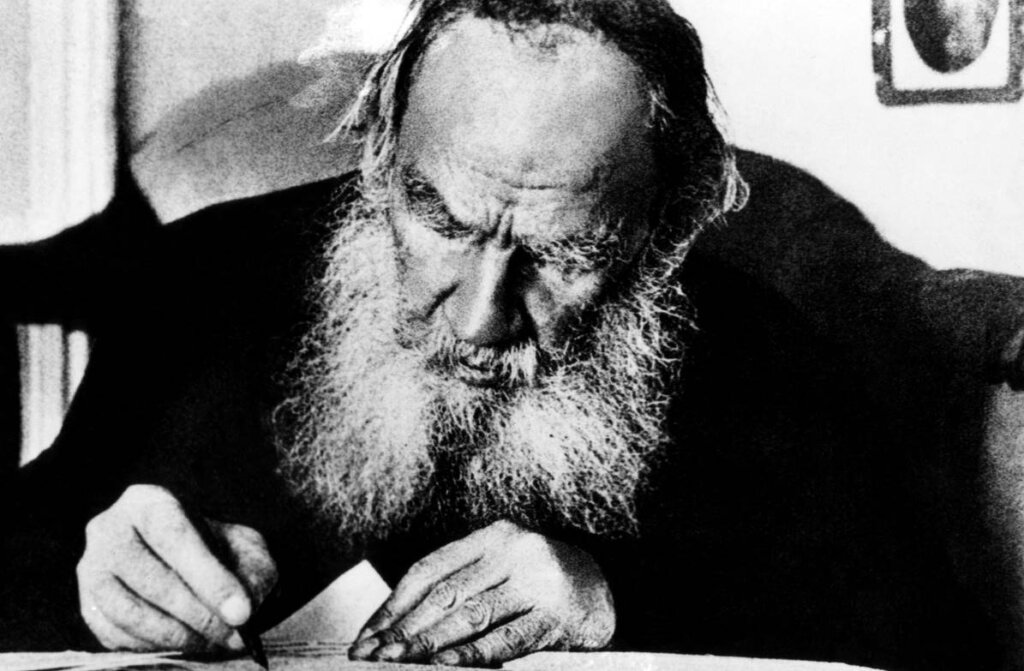Leo Tolstoy and his Calendar of Wisdom


Written and verified by the psychologist Valeria Sabater
Before he died, Leo Tolstoy had started giving away all his possessions to the poor. However, this wish wasn’t respected by his family. Just before he died, he said to the doctors surrounding him ” There are millions of people on the earth and many suffer. Why, then, are you all around me?”.
In life, Tolstoy had sowed many seeds of goodness. He put aside the luxury lifestyle, preferring to create schools for the children of peasants. He even taught them himself and both wrote and edited the books that his students studied. The pedagogy that he instilled in them was extremely simple yet powerful at the same time: to respect themselves and others.
However, one of the most renowned projects that Tolstoy carried out was his book, A Calendar of Wisdom, which he wrote in 1906. In this work, he compiled, over several years, some of the most luminous quotes from many great thinkers. They were the kinds of phrases that extolled coexistence, love, and kindness. In the book, Tolstoy commented on each one himself with his own individual brand of sensitivity.
This last book of Tolstoy’s, written over his last 15 years, sought to give meaning to our lives. And in today’s world, his praise for kindness is more relevant than ever.
“To create a book for millions of people …was incomparably more fruitful than to compose a novel of the kind which diverts some members of the wealthy classes for a short time, and then is forever forgotten.”
-Leo Tolstoy-

The gift that Leo Tolstoy left humanity
A Calendar of Wisdom was, according to Leo Tolstoy himself, the book of his life. It was a gift to the people, a source of knowledge that the reader could consult every day to learn, be inspired, and understand the world via the wisest figures in history. At the end of each weekly chapter, he included a personal reflection of about ten pages.
Interestingly, the Russian edition was banned after the October Revolution of 1917. They dismissed his book as too spiritual and not sufficiently adjusted to the ideals of the Soviet regime. Yet, in reality, Tolstoy only sought to intellectually enrich the population. It wasn’t until 1995 that his work on the praise of kindness saw the light of day again in Russia.
Thousands of copies of Tolstoy’s book have been sold. Indeed, time doesn’t exist in the world of books and their messages. Therefore, quotes such as those included in this book remain eternally capable of enlightening humanity.
Tolstoy lived part of his life gripped by the darkest visions due to years spent on the battlefield. In his opinion, educating in kindness and wisdom was the only salvation for humanity. In fact, this was the gift he bequeathed to us with his most precious book.
1. Whatever happens, always respond with kindness
“You should respond with kindness toward evil done to you, and you will destroy in an evil person that pleasure which he derives from evil.”
The Crimean War had a profound impact on the author of War and Peace. It destroyed his values and he suffered a deeply personal crisis that gave way to a subsequent personal revolution. In fact, Tolstoy was an exponent of nonviolent resistance. This perspective later inspired figures like Gandhi and Martin Luther King.
With his ideology and sensitivity, Tolstoy defended the need to always respond with kindness to aggressive acts. He believed that respect, tolerance, and integrity prevent evil from perpetuating its power.
2. True love
“Love is real only when a person can sacrifice himself for another person. Only when a person forgets himself for the sake of another, and lives for another creature, only this kind of love can be called true love…”
To love is to care for, respect, and deactivate selfishness, a quality that’s deeply rooted in the human being. True love, for Leo Tolstoy, meant being able to offer ourselves to whoever we have in front of us, via activism and firm commitment. Indeed, he practiced it himself, turning to help those most in need and giving up a life of luxury to offer the best of himself to others.
3. Kindness makes us more lucid
“Kindness enriches our life; with kindness mysterious things become clear, difficult things become easy, and dull things become cheerful.”
Are kindness and intelligence related? In reality, wisdom is more closely linked to kind behavior than intelligence. Wisdom is bordered by entities such as good judgment, serenity, the empathic mind, and ethical behavior.
Leo Tolstoy wasn’t wrong when he pointed out that kindness allows us to see reality more clearly. In fact, it’s from the prism of humanity, honesty, and tolerance that wisdom expands, leaving interests and selfishness on the margins.

4. Offer what you seek to receive
“Nothing can make our life, or the lives of other people, more beautiful than perpetual kindness.”
Most of us are extremely clear about what we want to receive from others: respect, understanding, recognition, affection, and kindness. That said, sometimes we forget that we can’t demand that they offer us something that we ourselves don’t give to them. Leo Tolstoy points out in A Calendar of Wisdom that nothing is more important in the world than kindness.
Tolstoy reminds us that good comes to us when we integrate kindness into our hearts and exercise it on a daily basis. In fact, the biggest of social transformations often only require a small spark of kindness. Moreover, kindness costs nothing, and practicing it can change our entire reality.
Tolstoy devoted over 15 years of his life to writing this book. It was the most important of all his projects, an eternal gift for educational purposes that has served as an inspirational guide for humanity. It’s a nurtured legacy of calm, wisdom, tenderness, and happiness. In short, it’s a book that’s well worth reading.
All cited sources were thoroughly reviewed by our team to ensure their quality, reliability, currency, and validity. The bibliography of this article was considered reliable and of academic or scientific accuracy.
- Tolstoi, Leon (2017) Calendario De La Sabiduría. MARTINEZ ROCA
- Porché, François (1958). Tolstói: retrato psicológico. Buenos Aires: Losada.
- Rolland, Romain (2010). Vida de Tolstói. Acantilado.
This text is provided for informational purposes only and does not replace consultation with a professional. If in doubt, consult your specialist.








